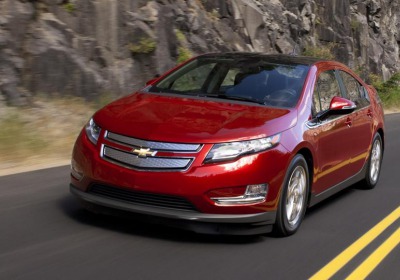Simple Rule: Technology Costs
Mon, 22 Oct 2012
Close your eyes. Imagine you're at the turn of the 20th century. A favorite broadsheet tells you that these new-fangled automobile gadgets are dangerous rattle traps that foul the air and that they are singularly profound failures!
These “auto-mobiles” are powered by steam, electrics or gasoline! They terrorize the very horse-drawn carriages that have been the backbone of American transportation for hundreds of years! They are a costly new technology with no place on our roads. Bah-humbug.
Move forward to just a few weeks ago. The august voices of Washington Post editors pronounce the Chevrolet Volt a failure. As evidence, they say its technology has not been wholly embraced by consumers and its per-unit cost is extraordinarily onerous.
Obviously, it must be a failure.
The car has been on sale for two years and since there aren't two or three Volts in every U.S. garage, that must mean it's not a success. To prove their point, the editors found analysts to say every Volt sold to date costs General Motors $90,000 apiece! And here's a company that was bailed out by the Feds so the taxpayers are getting hosed. . . .
Is it wrong to say this is a case where “they will make it up in volume”?
By the Post's reasoning, the first new global-model Fusion that Ford sells will cost the company something on the order of a billion and a half dollars. But somehow they ignore that with each successive Fusion sold, that number will be reduced and eventually the investment will be amortized. . . .
Here's how much of a failure the Volt is: It earned “Car of the Year” honors on these shores and in Europe. According to a leading consumer guide, Volt owners gave it the highest ownership rating in that publication's history.
I say bravo to General Motors, Nissan, Toyota and every other company stretching the boundaries of technology and taking risks in the interest of bringing advanced fuel-saving innovations to consumers. That includes every automaker and supplier investing in the future. (I also say bravo for advancements in other technologies, too, from safety to comfort to ride and handling. . . . Well, you get it.)
We cannot be a country beholden to gasoline-powered internal-combustion-engine vehicles forever. We must develop electrics and plug-ins, hybrid diesels and stand-alone diesels. Hell, if plutonium could power cars at a reasonable cost, bring it on.
The point is, there's a cost associated with building anything. There are no inexpensive, easy fixes. Technology and its development cost money. Remember when only the very wealthy could afford color television sets?
Here is something that might strike closer to home for the Post editors:
After the first cellphone was introduced, it was almost 20 years before the technology became popular. In 1973, Motorola showed a prototype of the world's first portable cellular telephone. Nicknamed “The Brick,” it measured nearly a foot long, weighed 2.5 pounds and cost nearly $4,000. It only became commercially available after a decade and $100 million in product development and infrastructure building.
That $100 million, adjusted for inflation—say from mid-point 1978—is $352,112,676.06 in today's dollars.
Today, cellphones are ubiquitous. Our kids think they've always been here. Remind them it wasn't until 1990 when mobile phones really started to catch on. The wireless communication trade association CTIA says that in 1985 there were 340,000 cellphone subscribers. In 1990, there were more than 5 million. Today, the number of people with mobile-phone subscriptions reaches well into the billions—and counting.
Electric vehicles and plug-in hybrid electric vehicles, along with many other game-changing inventions, will continue to prove that if you have what you think is a useful product, the worst thing you can do is pay attention to those who say it can't be done.
I'm delighted there are people and companies that push against the status quo to make our lives better, even if it costs us in the short run.
By Dutch Mandel

